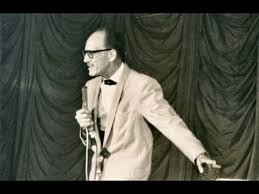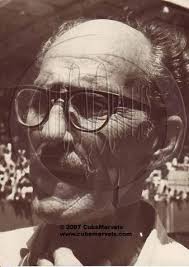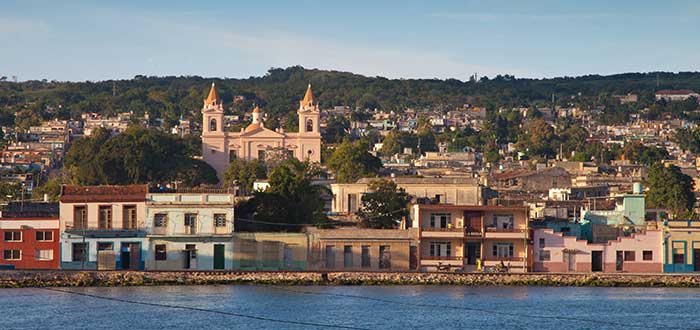 EL POLIFACETICO ACTOR GERMAN PINELLI, CANTANTE, LOCUTOR, PERSONALIDAD DE TV.
EL POLIFACETICO ACTOR GERMAN PINELLI, CANTANTE, LOCUTOR, PERSONALIDAD DE TV.
German Pinelli cuyo verdadero nombre era Gregorio José Germán Piniella Vázquez de Mella nació en La Habana el 15 de diciembre de 1907. Su padre era comerciante en el alto comercio habanero sin llegar a ser burgués, y su madre era una mujer de vasta cultura. Cambió su nombre a German Pinelli para hacerlo más comercial para la radio y luego para la televisión.
Su primera incursión en los medios de comunicación tuvo lugar cuando tenía apenas 14 años, el 28 de octubre de 1922. El entonces alumno del prestigioso Colegio de Belén cantaba a través de las ondas radiales, menos de cuatro meses después de haber realizado la primera transmisión radial en Cuba. Esta transmisión de la PWX de la Telefónica Cubana se realizó desde el Teatro Campoamor de la capital, en lo que se considera el primer control remoto musical de la planta.
Se alejó del arte para matricularse en Derecho en la Universidad de La Habana, pero, en 1925, abandonó la carrera para seguir a su hermana Soledad en una gira por toda la isla, como parte de la compañía teatral en la que actuaba, cantaba y él. declamado. Anteriormente, había ganado una beca para estudiar “bel canto” en Italia, pero nunca recibió los fondos.
A pesar de no haber completado la educación superior, de forma autodidacta, aprendió varios idiomas (inglés, francés e italiano) y varios instrumentos musicales (guitarra, piano, sierra musical). Formó parte de la compañía de zarzuelas del Teatro Payret, con la que interpretó obras como El gato montés. Pinelli vio frustrado su trabajo como cantante lírico tras sufrir daños en el sistema respiratorio. Sin embargo, a lo largo de su carrera artística, aprovechó con frecuencia su formación musical.
A principios de la década de 1930 trabajó en diversas emisoras de radio de la capital; entre ellos, La Mil Diez, CMCB ubicada en el Edificio “La Metropolitana”, en La Habana Vieja, el CMBN y el CMK. Se unió a CMQ en 1933 como editor de noticias del National Newsletter y dos años después ya era editor y jefe de cuatro noticieros de la poderosa planta.
Su debut como locutor fue en un programa de medianoche dedicado a la transmisión de música grabada. Para actuar como locutor tuvo que enfrentarse al criterio contrario de Goar Mestre, dueño del CMQ, quien, en un principio, dudó de su aptitud para la locución. Años después, en diciembre de 1937, se estrenó como presentador del popular espacio La Corte Suprema del Arte. De este programa de participación surgieron destacadas figuras del mundo del espectáculo como la estadounidense Vedette, Rosita Fornés. Con los ganadores del concurso, conocidos como CMQ Rising Stars, Pinelli dirigió y presentó múltiples programas que se presentaron en los cines de casi todo el país.
Durante el año 1942, escribe una sección del periódico ‘Avance’, titulada ‘CMQ inside’, mientras trabajaba para el departamento literario de la poderosa emisora de radio. En su carrera como locutor destacan algunos trabajos, como la retransmisión habitual del programa del líder del Partido Ortodoxo, Eduardo Chibás, que se emitió todos los domingos a las 20 horas, en las ondas de la CMQ, desde febrero de 1944 a Agosto de 1951. Pinelli no hizo el anuncio el día en que Eduardo Chibás se suicidó en el stand de CMQ, pero tuvo un papel protagónico en la transmisión de la noticia relacionada con este hecho.
Además, se recuerda su narración en vivo de la masacre de Orfila el 15 de septiembre de 1947. Otros momentos históricos contaron con la voz del insigne locutor: la inauguración del edificio Radiocentro, en marzo de 1948 y, tras el triunfo revolucionario, algunas marchas patrióticas y el entierro de las víctimas del sabotaje a vapor de La Coubre.
El 18 de diciembre de 1950, cuando se hizo la programación de la segunda televisión cubana (CMQ TV, Canal 6), Pinelli sí se impuso en su talento para crear un nuevo tipo en la conducción de los anuncios televisivos. El día de la inauguración de la planta, con la pérdida del guión y desafiando la desconfianza de Goar Mestre, Pinelli fue llamado a improvisar y llenar el espectáculo. A partir de ese momento, su labor como comunicador se consolidó con la aprobación del público.
La estación de televisión le ofreció la oportunidad de actuar en otros géneros y roles. Como animador hizo ‘El Show del Mediodia’ (1951) y, junto a José Antonio Brito Cepero, “Todos hacen de Todo” (1951-1960). El narrador fue ‘Muñequitos’ (1952), ‘Zenith y Norge Alphabet’ (1953).
Durante muchos años inmortalizó a su personaje, Éufrates del Valle en el programa humorístico ‘San Nicolás del Peladero’, personaje que fue llevado al cine por Tomás Gutiérrez Alea en la película ‘Supervivientes’.
Después de 1959, protagonizó muchas áreas comunes de la televisión y el mundo del espectáculo. Entre sus memorables, se encuentra el personaje de Éufrates del Valle en San Nicolás del Peladero, programa de modales que mantuvo altos índices de aprobación durante 20 años (entre 1960 y 1980). Durante ese tiempo compartió pantalla con muchas de las grandes figuras de la radio, la televisión, el teatro y el cine cubanos. Entre ellos se pueden mencionar Enrique Santiesteban, María de Los Ángeles Santana y Enrique Arredondo.
En una anécdota sobre el Che Guevara, luego del triunfo de la revolución, cuando Pinelli se presentó al argentino y lo llamó “Che” este le contestará “Che para mis amigos, para ti Ernesto Guevara”, el hombre (Che) era arrogante y irritante.
Durante su vida, recibió muchos honores tanto de la comunidad cultural como del gobierno. Recibió numerosos premios nacionales y fue uno de los pocos locutores latinoamericanos que recibió dos veces el Wave Award, un premio otorgado a los mejores locutores en español en reconocimiento a su trabajo.
Estuvo casado tres veces. Su hermana fue la actriz cubana Sol Pinelli y su hijo es Tony Pinelli, el galardonado compositor, cantante y erudito musical cubano. Los hijos de Tony son el alemán David Pinelli (nacido el 24 de septiembre de 1973) y Ari A. Pinelli (nacido el 9 de junio de 1976), quienes junto con la esposa de German David, Ana Paez (nacida el 9 de enero de 1966) son miembros del grupo musical cubano Los Tres de la Habana.
Germán Pinelli murió en La Habana el 20 de noviembre de 1995, a los 88 años de edad. Está enterrado en el Cementerio de Colón, La Habana, Cuba.
 THE MULTIFACETED ACTOR GERMAN PINELLI, SINGER, ANNOUNCER, TV PERSONALITY.
THE MULTIFACETED ACTOR GERMAN PINELLI, SINGER, ANNOUNCER, TV PERSONALITY.
German Pinelli full name Gregorio José Germán Piniella Vázquez de Mella, was born in Havana on December 15, 1907. His father was a merchant in the high trade of Havana without becoming a bourgeois, and his mother was a woman of vast culture. He changed his name to German Pinelli in order to make it more commercial for radio and later television.
His first foray into the mass media took place when he was just 14 years old, on October 28, 1922. The then student of the prestigious Colegio de Belén sang through the radio waves, less than four months after having performed the first radio broadcast in Cuba. This transmission of the PWX of the Cuban Telephone Company took place from the Campoamor Theater in the capital, in what is considered the first musical remote control of the plant.
She moved away from art to enroll in Law at the University of Havana, but, in 1925, she abandoned her degree to follow her sister Soledad on a tour throughout the island, as part of the theatrical company in which she acted, sang and he declaimed. Previously, he had won a scholarship to study “bel canto” in Italy but never received the funds.
Despite not having completed higher education, in a self-taught way, he learned several languages (English, French and Italian) and several musical instruments (guitar, piano, musical saw). He was part of the zarzuelas company of the Payret Theater, with which he performed works such as The Wildcat. Pinelli saw his work as a lyrical singer frustrated after suffering damage to the respiratory system. However, throughout his artistic career, he frequently exploited his musical education.
At the beginning of the 1930s, he worked in various radio stations in the capital; among them, La Mil Diez, CMCB located in the “La Metropolitana” Building, in Old Havana, the CMBN and the CMK. He joined CMQ in 1933 as a news editor for the National Newsletter and two years later he was already editor and chief of four newscasts for the powerful plant.
His debut as an announcer was on a midnight show dedicated to broadcasting recorded music. To perform as an announcer he had to face the opposite criteria of Goar Mestre, owner of the CMQ, who, at first, doubted his aptitude for voiceover. Years later, in December 1937, he premiered as host of the popular space La Corte Suprema del Arte. From this participation program, prominent figures from the entertainment world emerged such as America’s Vedette, Rosita Fornés. With the contest’s winners, known as the CMQ Rising Stars, Pinelli directed and hosted multiple shows that were presented in theaters nearly across the country.
During the year 1942, he wrote a section of the newspaper ‘Avance’, titled ‘CMQ inside’, while doing work for the literary department of the powerful radio station. In his career as an announcer, some works stand out, such as the usual broadcast of the program of the leader of the Orthodox Party, Eduardo Chibás, which aired every Sunday at 8 p.m., on the airwaves of the CMQ, from February 1944 to August 1951. Pinelli did not make the announcement the day Eduardo Chibás shot himself in the CMQ booth, but he played a leading role in the transmission of the news related to this event.
In addition, his live narration of the Orfila massacre on September 15, 1947, is remembered. Other historical moments counted on the voice of the distinguished announcer: the inauguration of the Radiocentro building, in March 1948 and, after the revolutionary triumph, some patriotic marches and the burial of the victims of the La Coubre steam sabotage.
On December 18, 1950, when did the programming of the second Cuban television (CMQ TV, Channel 6), Pinelli did prevail in his talent to create a new type in the conduct of TV spots. The opening day of the plant, with the loss of the script and challenging the distrust of Goar Mestre, Pinelli was called to improvise and fill the show. From that moment, his work as a communicator was consolidated with public approval.
The television station offered him the chance to perform in other genres and roles. As an animator did ‘El Show del Mediodia’ (1951) and, along with Jose Antonio Brito Cepero, “Todos hacen de Todo” (1951-1960). The narrator was ‘Muñequitos’ (1952), ‘Zenith, and Norge Alphabet’ (1953).
For many years he immortalized his character, Euphrates del Valle in the humorous Program ‘San Nicolas del Peladero”. This character was made into a film by Tomas Gutierrez Alea in the movie ‘Survivors’.
After 1959, he starred in many common areas of television and show business. Among her memorable, is the character of Euphrates del Valle en San Nicolas del Peladero, manners program that maintained high approval ratings over 20 years (between the 1960 and 1980). During that time shared the screen with many of the great figures of radio, television, theater, and film Cubans. Among them may be mentioned Enrique Santiesteban, Maria de Los Angeles Santana, and Enrique Arredondo.
In an anecdote about Che Guevara, after the triumph of the revolution, when Pinelli was presented to the Argentine and called him “Che” this will answer ” Che for my friends, for you Ernesto Guevara”, the man (Che) was arrogant and irritating.
During his lifetime, he received many honors both from the cultural community as well as from the government. He received numerous national awards and was one of the few Latin American broadcasters who received twice the Wave Award, a prize awarded to the best Spanish-language broadcasters in recognition of their work.
He was married three times. His sister was the Cuban actress Sol Pinelli and his son is Tony Pinelli, the award-winning Cuban composer, singer, and musical scholar. Tony’s sons are German David Pinelli (born September 24, 1973) and Ari A. Pinelli (born June 9, 1976), who along with German David’s wife, Ana Paez (born January 9, 1966) are members of the Cuban musical group Los Tres de la Habana.
German Pinelli died in Havana on November 20, 1995, at 88 years of age. He is buried in the Colon Cemetery, Havana, Cuba.
Agencies/ Wiki/ Various/ Internet Photos/ YouTube/ Arnoldo Varona/ www.TheCubanHistory.com
THE CUBAN HISTORY, HOLLYWOOD.



 EL POLIFACÉTICO Actor German Pinelli, Cantante, Locutor, Personalidad de la TV. VIDEOS.
EL POLIFACÉTICO Actor German Pinelli, Cantante, Locutor, Personalidad de la TV. VIDEOS.








